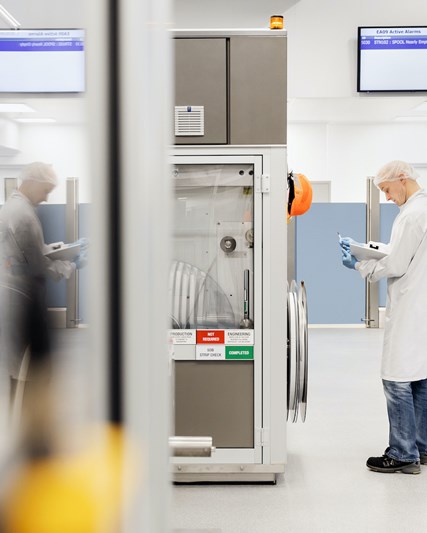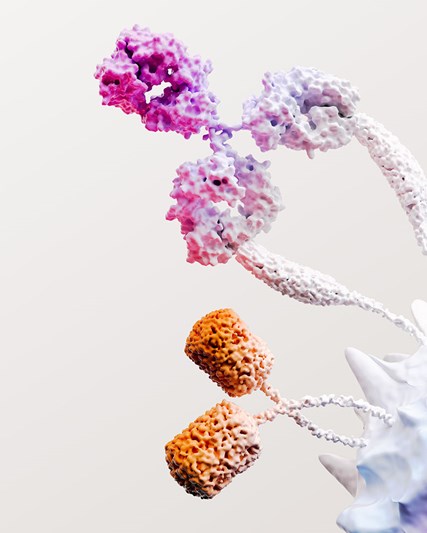Issued: London, UK
For media and investors only
GSK to showcase latest research at the International RSV Symposium to advance RSV prevention in adults
- World-leading experts to focus on RSV, a significant public health challenge with an estimated 64 million people of all ages impacted every year1
- 17 abstracts to evaluate unmet medical need and approaches to RSV prevention in adults
- Results include immunogenicity and safety data for GSK’s RSV vaccine
GSK plc (LSE/NYSE: GSK) will share its latest research findings on the respiratory syncytial virus (RSV) at the 13th International RSV Symposium in Iguazu, Brazil (12-15 March). This symposium brings together the world's leading experts in the field to discuss the latest advancements in RSV research, prevention, and treatment.
During the conference, GSK and collaborating experts will present a total of 17 abstracts covering a range of topics, including the epidemiology and burden of RSV, several late-stage clinical read outs on Arexvy (respiratory syncytial virus vaccine, recombinant adjuvanted), GSK’s RSV vaccine, cost-effectiveness modelling, and analysis of the potential impact of different circulating RSV strains on the efficacy of GSK’s RSV vaccine.
Susie Barnes, SVP, Head of Global Medical Affairs, Vaccines said: “As a leader in innovation and prevention, we are committed to collaborating with the global scientific community to better understand the challenge of RSV in adults. To date, more than 11 million adults globally have received our RSV vaccine, generating robust data on the impact of immunisation to help improve public health and protect those at risk.”
An estimated 64 million people globally of all ages are impacted by RSV every year, including older adults and those with certain underlying medical conditions.2 Despite RSV vaccines, including GSK’s vaccine, being available in over 60 markets, only a minority of eligible adults have been immunised so far. In the US, about 24% of eligible adults had received a RSV vaccine by the end of the 2023–24 season.3 The International RSV Symposium is an opportunity to present data to strengthen understanding of the risks of RSV in adults and the potential benefits of RSV vaccination amongst healthcare professionals and the scientific community.
Key abstracts to be presented at International RSV Symposium
New data to advance understanding of and improve RSV prevention in adults:
- AReSVi 004 – 36-month immunogenicity: data from a phase 3 study evaluating immunogenicity and safety following administration of a second dose of GSK’s RSV vaccine 36 months after initial vaccination in adults aged 60 years and older.
- AReSVi 006 – strains sequencing: using GSK’s AReSVi-006 phase 3 efficacy study, this analysis focuses on the genetic variations of the virus over three RSV seasons and the potential breadth of efficacy of GSK’s RSV vaccine against these variations.
- AReSVi 006 – patient reported outcomes: results from the analysis of patient-reported data evaluating the impact of RSV infection in vaccinated and non-vaccinated people enrolled over three RSV seasons in the phase 3 efficacy study.
- NCT05921903 – vaccine dosing in immunocompromised patients: data from a phase 2b study evaluating the immune response and safety of GSK’s RSV vaccine in adults (≥18 years of age) who are immunocompromised due to lung and renal transplant, comparing one versus two doses one month after the second vaccine administration compared to a control group of non-immunocompromised adults aged 50 and above receiving a single dose of GSK’s RSV vaccine.
- NCT06389487 – vaccine response in adults 18-49 years of age at increased risk of RSV disease: data from a phase 3b study evaluating the non-inferiority of the immune response and safety of GSK’s RSV vaccine in adults aged 18-49 at increased risk for RSV disease compared to adults aged 60 and older.
Full list of GSK presentations at RSV Symposium
| Abstract name | Presenter | Presentation details |
|---|---|---|
|
The AS01E-adjuvanted RSV prefusion F protein vaccine (adjuvanted RSVPreF3) attenuates the severity of RSV-associated disease in breakthrough infections in adults aged 60 years and above: analysis at the end of 3 RSV seasons |
Eliazar Sabater Cabrera (GSK) |
Oral presentation |
|
Immunogenicity and safety of the AS01E-adjuvanted respiratory syncytial virus prefusion F protein vaccine (adjuvanted RSVPreF3) after different revaccination schedules up to 3 years post-first dose in adults aged 60 years and above |
Tino Schwartz |
Poster session |
|
Characterization of the antigenic specificity of the humoral response following primary versus repeated vaccination(s) with AS01E-adjuvanted RSV prefusion F protein vaccine (adjuvanted RSVPreF3) |
Lucile Warter (GSK) |
Poster session |
|
Immune response and safety of the AS01E-adjuvanted RSV prefusion F protein vaccine (adjuvanted RSVPreF3) in immunocompromised adults: Evaluating one vs two doses in lung and kidney transplant recipients, and compared to non-immunocompromised adults |
Veronica Hulstrom (GSK) |
Poster session |
|
The AS01E-adjuvanted respiratory syncytial virus prefusion F protein vaccine (adjuvanted RSVPreF3) has a non-inferior immunogenicity profile in adults 18–49 years of age (YOA) at increased risk of RSV disease compared to adults 60 YOA and above, and a clinically acceptable safety profile |
Essack Mitha |
Poster session |
|
The AS01E-adjuvanted RSVPreF3 vaccine exhibits broad efficacy against diverse RSV strains |
Lucile Warter (GSK) |
Poster session |
|
Epidemiology of respiratory syncytial virus in adults in low, lower-middle, and upper-middle income countries: An artificial intelligence-enabled systematic literature review |
Otavio Cintra (GSK) |
Poster session |
|
Modelled Public Health Impact of Adjuvanted RSVPreF3 Vaccination in Adults Aged 60 Years and Older in the United States over 5 Years |
David Singer (GSK) |
Poster session |
|
Modelled public health impact of respiratory syncytial virus (RSV) vaccination among United States (US) adults aged 60 years and older during the first season of vaccine availability |
Eliana Biundo (GSK) |
Poster session |
|
An overview of evolving recommendations for RSV active immunization in adults and their supporting clinical data |
Nicolas Lecrenier (GSK) |
Poster session |
|
Modeled Public Health Impact of Adjuvanted RSVPreF3 Vaccination in Adults Aged 50-59 years at Increased Risk for Severe RSV Disease in the United States over 5 Years |
David Singer (GSK) |
Poster session |
|
Characteristics Associated with Likelihood of RSV Testing in Adults Aged ≥50 Years in the United States |
David Singer (GSK) |
Poster session |
|
Clinical and economic burden of respiratory syncytial virus among adults hospitalized with acute respiratory infections in Portugal |
Maria João Fonseca (GSK) |
Poster session |
|
Respiratory syncytial virus (RSV) vaccine recommendations for adults: a review of available global, regional, and country level recommendations. |
Otavio Cintra (GSK) |
Poster session |
|
Respiratory syncytial virus Disease Burden in Older Adults with and without comorbidities: a decade of hospitalization data in Brazil (2013-2023) |
Lessandra Michelin (GSK) |
Poster session |
|
Combining European Efforts: A Methodological Framework to Assess RSV Hospitalization Burden pre- and post-COVID-19 in Children through RESCEU and PROMISE Collaboration |
Kocfa Chung-Delgado |
Poster session |
|
RSV incidence estimates in primary care among adults aged 50 years and older in the Netherlands; 2011-2019 |
Claudia Laarman |
Poster session |
About RSV in adults
RSV is a common contagious virus affecting the lungs and breathing passages. Adults can be at increased risk for RSV disease due to certain comorbidities, immune compromised status, or advanced age. RSV can exacerbate conditions, including COPD, asthma, and chronic heart failure and can lead to severe outcomes, such as pneumonia, hospitalisation, and death.4 Each year RSV causes over 465,000 hospitalisations and 33,000 deaths in adults aged 60 and older in high-income countries.5
About GSK’s RSV vaccine
Respiratory Syncytial Virus Vaccine, Adjuvanted, contains recombinant RSV glycoprotein F stabilised in the prefusion conformation (RSVPreF3). This antigen is combined with GSK’s proprietary AS01E adjuvant.
The use of this vaccine should be in accordance with official recommendations. As with any vaccine, a protective immune response may not be elicited in all vaccinees.
The GSK proprietary AS01 adjuvant system contains QS-21 STIMULON adjuvant licensed from Antigenics Inc, a wholly owned subsidiary of Agenus Inc.
About GSK
GSK is a global biopharma company with a purpose to unite science, technology, and talent to get ahead of disease together. Find out more at gsk.com.
Cautionary statement regarding forward-looking statements
GSK cautions investors that any forward-looking statements or projections made by GSK, including those made in this announcement, are subject to risks and uncertainties that may cause actual results to differ materially from those projected. Such factors include, but are not limited to, those described under Item 3.D “Risk factors” in GSK’s Annual Report on Form 20-F for 2024.
References
-
National Institute of Allergy and Infectious Diseases, Respiratory Syncytial Virus (RSV). Available at: https://www.niaid.nih.gov/diseases-conditions/respiratory-syncytial-virus-rsv – last accessed: February 2025
-
National Institute of Allergy and Infectious Diseases, Respiratory Syncytial Virus (RSV). Available at: https://www.niaid.nih.gov/diseases-conditions/respiratory-syncytial-virus-rsv – last accessed: February 2025
-
K. Bajema et al., “Respiratory syncytial virus vaccine effectiveness among US veterans, September 2023 to March, 2024: a target trial emulation study” in The Lancet Infectious Disease, Published Online January 20, 2025 https://doi.org/10.1016/S1473-3099(24)00796-5
-
Centers for Disease Control and Prevention (CDC), RSV in Older Adults, 2024. Available at: https://www.cdc.gov/rsv/older-adults/index.html - Last accessed: September 2024
-
Savic M, et al., “Respiratory syncytial virus disease burden in adults aged 60 years and older in high-income countries: a systematic literature review and meta-analysis”, in Influenza Other Respir Viruses, 2023, 17(1):e13031, DOI: 10.1111/irv.13031



